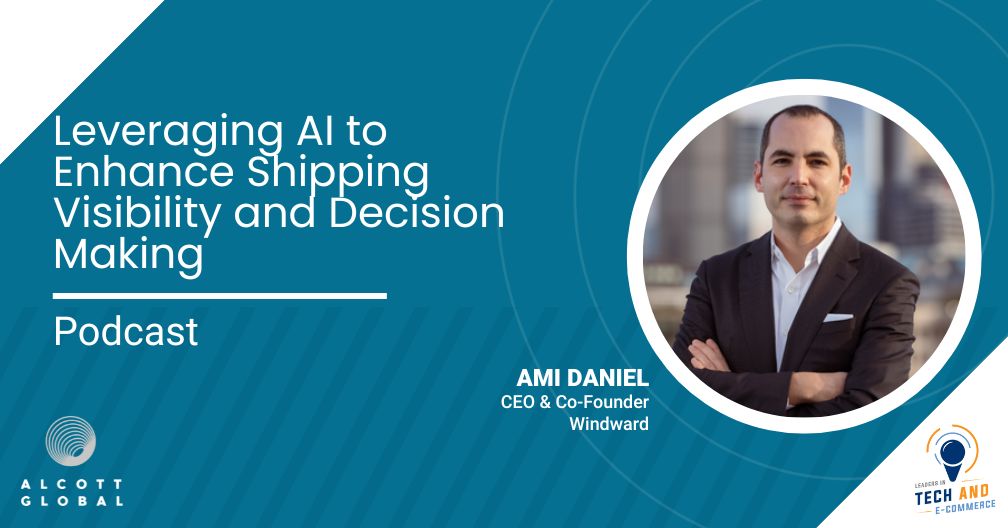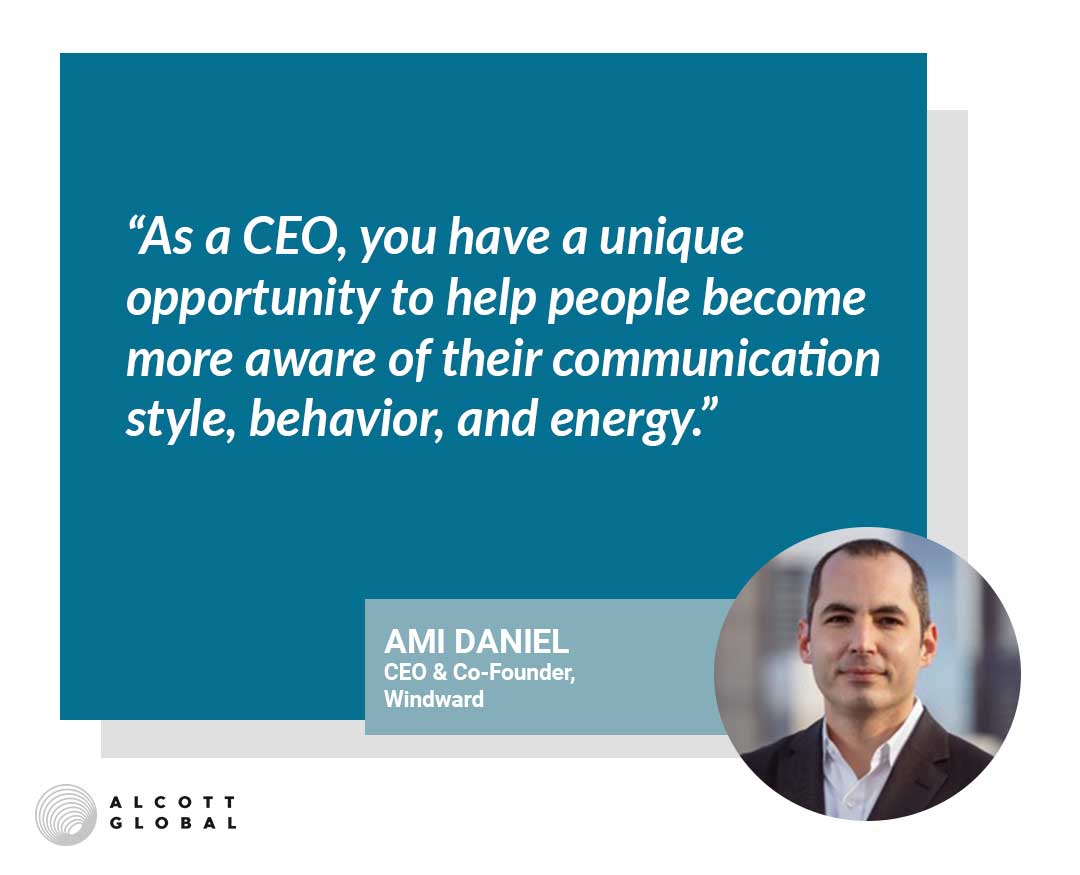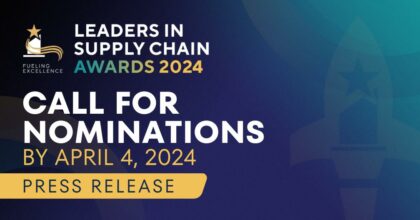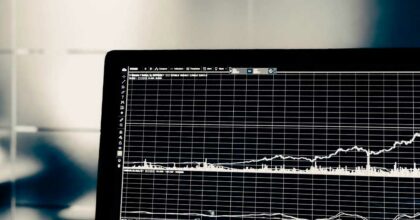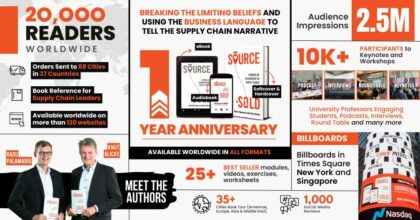Ami Daniel is the CEO & Co-founder of Windward.
He developed his passion for the sea during his seven-year veteran in the Israeli Navy and founded Windward with the mission of bringing Predictive Intelligence and big data analytics to the maritime ecosystem. In the last two decades, Ami has harnessed innovation and a relentless focus on driving transformative change to build successful organizations in both the nonprofit and private sectors.
He holds a BA in Law & Business from Tel Aviv University, and won numerous accolades over the course of his career, including the Ilan Ramon Award for Excellence and the Israeli President’s Award for Social Good.
Listen to the full discussion here:
- Listen on Stitcher
Connect with the Guest:
Ami Daniel: LinkedIn
Some of the highlights from the podcast:
- Ami’s story from a Naval Officer to becoming Winward’s CEO
- What does Winward do and how they assist company clients
- Data collection process at Winward
- Prioritizing mental health and caring for personal and HR culture
- Essential soft skills for Winward is looking for future employees
- Book recommendations by Ami
Show notes:
- [0:56] How’s your journey to being co-founder and CEO? How did you end up here?
- [2:14] A CEO may sound like somebody who does some corporate strategy work. But a founder sounds like somebody who builds stuff andI kind of do both.
- [2:43] What was the messaging back then 12 years ago? What was the company providing and how have you evolved until now?
- [4:52] What exactly does Winward do? How are you helping your company clients?
- [4:56] So what we do is we’re shipping an AI company, which means we process tons of data sources from around the world on a second-by-second basis, almost half a billion data points per day. And we fuse them using cloud technologies and we create profiles of vessels, companies, ports, and cargoes.
- [7:36] Are you creating your own data? Or are you taking the data which is provided by those companies, which is probably not end-to-end? How do you manage those data? How are you collecting it and is your major investment in data centers?
- [7:55] The first one is what is your data architecture and how you build I think architecture. The second thing is to make sure that that database is clearable. Next up we invest a lot in what’s called machine learning operations in short, MLOPs. Last but not least, we’ve invested time in an API-first platform.
- [13:38] Can you share some examples of clients who have experienced positive changes as a result of using your product through successful case studies?
- [14:26] They use our predictive eta and our data to give better customer service, which means that they reduce the manual grunt work of collecting where the container is, they reduce the number of updates to their customers, and when is it going to arrive.
- [17:27] What’s the real return on investment on visibility cost?
- [20:52] For us, visibility is the starting point. But actually, it’s much more interesting to talk about decision support recommendations. So for us providing a predictive eta is a form of decision support.
- [23:34] What are your thoughts on ChatGPT? Do you think we are getting really close to having a kind of a system or a machine creating almost a future from learning from the past? And do you think people should be worried about their jobs?
- [24:43] Absolutely, the world is changing. And they think the grunt work of repetitive work that right now we’re doing is going to slowly come down. And it will make room for people to make creative decisions.
- [27:43] Do you see ChatGPT coming within Winward anytime soon, where you kind of start collaborating, because I start seeing that now you can actually buy data on any kind of buy this tool where they start working with your data?
- [29:08] We need to find the right technology to use and unnaturally large language models are the right technology for this specific problem. But absolutely, we’re looking at it like like everybody else in the world.
- [29:36] How do you ensure that your data collection and analysis methods align with sustainable practices?
- [31:47] So our perspective about sustainability, the way we build products is we use AI to predict the future consumption of vessels with a 95% accuracy.
- [33:02]How do you prioritize your personal health as a leader who makes many decisions? Additionally, how do you assess the state of the business, recognize signs of mental health issues among employees, and provide support for those who may be struggling?
- [34:46] I practice mindfulness every day, including when I run but also before I sleep. I cleanse my brain every weekend.
- [37:08] On the HR culture side, once you’re able to identify somebody’s going through a hard time, do you have any kind of policy within the business, which provides them extra leaves or extra support? Is there any issuing support you provide?
- [37:29] We don’t try to solve that with policies. We tried to solve this with sensitivity and culture.
- [39:19] What is a specific soft skill that you consider essential when evaluating a prospective employee, and that you believe must be present in the person before hiring them?
- [39:27] I think it’s listening and engaging proactively. A lot of people talk a lot of people listen, but not a lot of people do active listening. So I want us to interact. And I want to respond to what you’re saying and I want you to respond to what I’m saying.
- [42:38] Can you share three books, which you have read, that you think changed your life and help you a lot three books, which you highly recommend for people?
- [42:48] So “The Hard Thing About Hard Things”, which I love by Ben Horowitz, cofounder of Andreessen Horowitz. “Outliers” by Malcolm Gladwell absolutely changed my mind and changed my view about reality. And if you’re in the technology business, I would really recommend two more books. One is “Crossing the Chasm” and the second is inspired by Marty Kagan, which really takes you through how to build products.
Quote from the Episode:
Soundbite from the Episode:
About the Host:
The host, Rushit Shah is the Managing Director of APAC and North America at Alcott Global. Rushit comes with 20 years of Executive Search and Selection with 8 years of Supply Chain Consulting service within APAC. He worked for more than 40 countries with diversified industries and functionality.
Alcott Global connects and upgrades the supply chain ecosystem by finding the right talent through executive search, developing talent through learning solutions, and meeting supply chain technology needs through a comprehensive crunch base marketplace.
The supply chain executive search has been our focus since the very beginning, offering recruitment services for top-tier supply chain roles at every level of the end-to-end supply chain: plan, source / procure, make, and deliver. Our consultants have years of experience in placing top talent, in North America, LATAM, Europe, the Middle East & Africa, and APAC, and besides speed, one of our biggest strengths is our network within the supply chain industry, and we capitalize on it to find the best solutions.
Through the years, we have grown as an organization and our offerings with it. One of our initiatives, the learning solutions- training and supply chain academy, is focused on transforming leadership- self-leadership, executive presence, influence capital, and business acumen. Through Supplify, we aim to match corporations with the top technology companies to solve their supply chain and logistics challenges with a focus on innovation and digital transformation.
We are in constant touch with the leaders in supply chain, inviting them to inspire the supply chain professionals in thought-provoking podcast episodes and events, and showcasing what is possible at the yearly Leaders in Supply Chain Awards.
Related Episodes:
Succeed in the E-commerce Market Through Innovative Solutions

